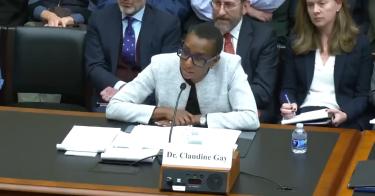The U.S. House of Representatives summoned the presidents of Harvard, MIT, and the University of Pennsylvania to a hearing this week to address the alarming rise of overt antisemitism on their campuses following the Hamas attacks on Israel two months ago. Their responses made it all too clear why one of the oldest and most disgraceful forms of bigotry flourishes today in academic circles.
The refusal of the leaders of our most elite universities to answer questions directly and to acknowledge inconsistencies in their institution’s response to hatred vented toward Jews and other groups was a shocking display of moral cowardice and intellectual dishonesty.
Rep. Elise Stefanik tried repeatedly to ask the presidents of Harvard, MIT, and Penn whether calling for the genocide of Jews constituted bullying, harassment, and intimidation in violation of their codes of conduct. All three declined to give a yes or no answer, saying that it depended on the context. They suggested that if crowds of students chanting genocidal slogans crossed into "conduct" it could be punished.
Good to know. It appears that actually murdering Jews, since it is conduct, is subject to university discipline, but only calling for their murder—even as Jewish students walk to their dorms or sit in class—is just part of the robust dialogue needed to shape our best and brightest.
>>> The Root Cause of the Insanity on College Campuses Is Older Than You May Think
The sudden adoption of an absolutist free-speech position by these universities is especially surprising given that none of them upheld that principle when non-Jews were the targets. Harvard’s record of failing to protect free speech is so abysmal that it was awarded the lowest possible rating by an academic freedom advocacy organization.
As Rep. Stefanik noted, Harvard removed the Dean of Winthrop House, who is also a professor in the law school, after he agreed to serve as an attorney for disgraced Hollywood mogul Harvey Weinstein. Harvard also revoked admission for several students for statements they had made on social media.
Penn’s record of protecting free speech is hardly better, earning it the second worst free-speech ranking from the same group that placed Harvard dead last. The university is in the midst of trying to fire a professor, Amy Wax, who has been an outspoken critic of diversity, equity, and inclusion efforts on campus. Had she called for genocide (but only against Jews), she might be safe from university action.
MIT scores better on the free-speech rating, but still has its issues. Climate scientist Dorian Abbot, for example, was famously disinvited from speaking at MIT—not for his views on global warming, but because he has vocally opposed diversity, equity, and inclusion initiatives.
MIT has also refused to enforce its own rules and punish anti-Israel protestors because many of them are foreign students and being disciplined may jeopardize their foreign visas and result in deportation. MIT could not be more clear about who matters more—not Jewish students facing abuse, but the foreign students abusing them.
The hypocrisy of suddenly discovering a deep commitment to free speech when Jews are the ones being attacked is bad enough, but an anything-goes approach to speech on campus is also educationally inappropriate. Yes, universities should foster the expression of differing perspectives, but they should do so in service of the search for truth, which should be the central mission of higher education.
The rules governing free speech are different on campus than they are on the street corner. People can shout whatever genocidal nonsense they want in public, but in educational settings that speech can be restricted to ensure that it does not interfere with learning opportunities. In fact, all universities receiving federal subsidies must ensure that students do not face significant harassment based on their race, sex, or ethnicity—including Jews. The U.S. Department of Education has just launched investigations of Harvard and Penn for violating Jewish students’ civil rights, which gives you an idea of how bad things have gotten.
>>> EVENT: For the Promotion of Learning and Virtue: Moral Education in the University
The presidents of Harvard and Penn must have realized how disastrous their inability to condemn calls for genocide as a violation of their university’s code of conduct was, because each issued carefully crafted statements after the fact in a weak effort to save their reputations and perhaps their jobs. There are reports of an emergency meeting of the Penn Board of Trustees, suggesting that Penn’s president may lose her position over this debacle.
Nothing will get better without external pressure. As many representatives suggested at the hearing, Congress should reconsider the incredibly generous subsidies taxpayers provide to these universities coddling antisemites. If that’s the kind of education Harvard, MIT, and Penn wish to offer, let them do it on their own dime, which is especially true given that these three universities have nearly $100 billion in endowment funds between them.
In addition, donors need to close their wallets and start demanding accountability for the irresponsible leadership exhibited by the presidents of Harvard, MIT, and Penn. These places aren’t the same as the one in the fond memories of their alums. Larger donors, like Bill Ackman at Harvard and Marc Rowan at Penn, are organizing donor strikes until changes are made.
But the most powerful form of accountability would be the removal of the presidents of these universities. Senior administrators in higher education are characterized more by ruthless ambition than they are by deep principle or scholarly accomplishment. If they see others losing their jobs for failing to stand up to antisemitism, they’ll all get in line.
This piece originally appeared in Fox News



